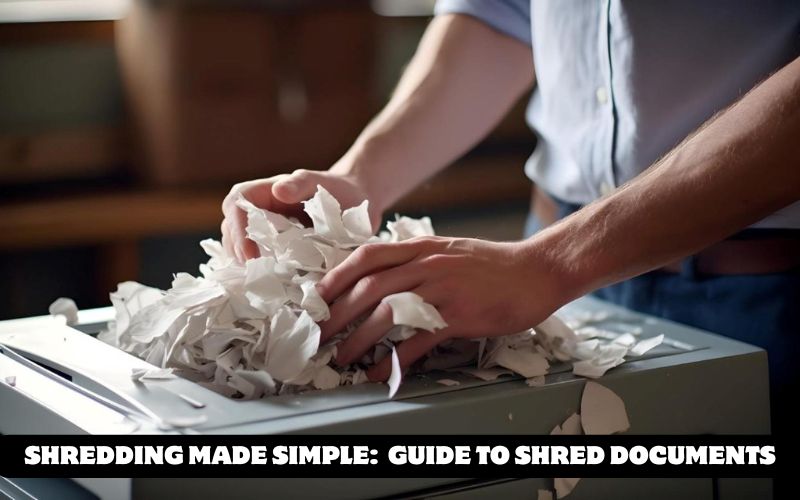In this digital age, it’s easy to forget about the importance of shredding physical documents. But let’s not overlook this crucial step in protecting our sensitive information.
Whether it’s old bank statements, credit card offers, or outdated bills, shredding helps prevent identity theft and keeps your personal data safe. So, let’s dive into the world of shredding and learn how to do it effectively.
Why Shred?
You might be wondering, why bother shredding? Well, the answer is simple: security. When you throw away documents with sensitive information, you’re essentially giving identity thieves a gold mine.
From financial records to personal details, these documents can be used to steal your identity, commit fraud, and wreak havoc on your life. But by shredding these papers into tiny pieces, you make it nearly impossible for thieves to piece them back together.
What to Shred:
Now that we understand why shredding is important, let’s delve into what specific types of documents or materials should be shredded. Any document or material containing personal, sensitive, or confidential information should be shredded before disposal to prevent identity theft, fraud, or unauthorized access. This includes but is not limited to:
- Financial Documents: Bank statements, credit card statements, receipts, canceled checks, tax documents, investment statements, and any documents containing account numbers or financial details.
- Personal Identifiers: Documents containing your full name, address, phone number, date of birth, social security number, driver’s license number, passport number, or any other form of personal identification.
- Medical Records: Prescription labels, insurance forms, medical bills, and any documents containing health information or sensitive medical details.
- Employment Documents: Pay stubs, performance evaluations, employment contracts, job applications, and any documents containing employment history or sensitive workplace information.
- Legal Documents: Legal correspondence, court documents, contracts, leases, and any documents containing legal agreements, disputes, or confidential legal information.
- Utility Bills: Gas, water, electricity, and any other utility bills containing personal or account information.
- Expired IDs or Cards: Expired passports, driver’s licenses, credit cards, or any other identification cards containing personal information.
- Junk Mail: Any unsolicited mail containing personal information, such as pre-approved credit card offers, should also be shredded to prevent potential misuse.
- Travel Documents: Boarding passes, itineraries, and any documents containing travel plans or personal information related to travel.
- Sensitive Correspondence: Any letters, emails, or documents containing sensitive or confidential information that you no longer need to retain should be shredded.
By shredding these types of documents and materials before disposal, you significantly reduce the risk of identity theft or unauthorized access to your personal information.”
Choosing a Shredder:
When it comes to shredders, there are several options to choose from:
- Strip-Cut Shredders: These shred documents into long strips. While they’re more affordable, they offer the least security as the strips can be reassembled.
- Cross-Cut Shredders: These cut documents into small, confetti-like pieces, providing better security than strip-cut shredders.
- Micro-Cut Shredders: The most secure option, micro-cut shredders turn documents into tiny particles, making it nearly impossible to reconstruct them.
You may like: Beyond Accuracy: Exploring the Transformative Power of Precision Scales
Shredding Tips:
Here are some tips to make the shredding process easier and more efficient:
- Invest in a good quality shredder that meets your security needs.
- Shred documents as soon as you no longer need them to reduce the risk of identity theft.
- Remove staples, paper clips, and any other non-paper items before shredding.
- Empty the shredder’s bin regularly to prevent jams and maintain optimal performance.
- Consider shredding old credit cards, CDs, and DVDs to protect sensitive data stored on them.
Reliable Shredding Company:
If you have a large volume of documents to shred or prefer to outsource this task, consider hiring a shredding company like Absolute Destruction. These professionals ensure secure and efficient disposal of your sensitive information, giving you peace of mind. Be sure to research and choose a reputable company with a track record of reliability and security.
Wrapping it up
Shredding is a simple yet effective way to protect your personal information from falling into the wrong hands. By investing in a quality shredder and making shredding a regular habit, you can safeguard yourself against identity theft and fraud. So, don’t wait any longer – start shredding today and enjoy peace of mind knowing that your sensitive information is secure.
